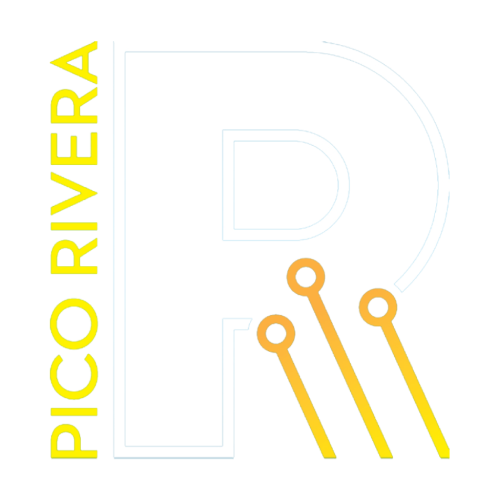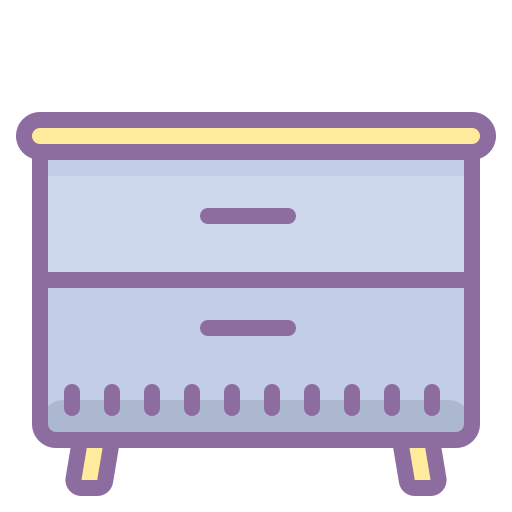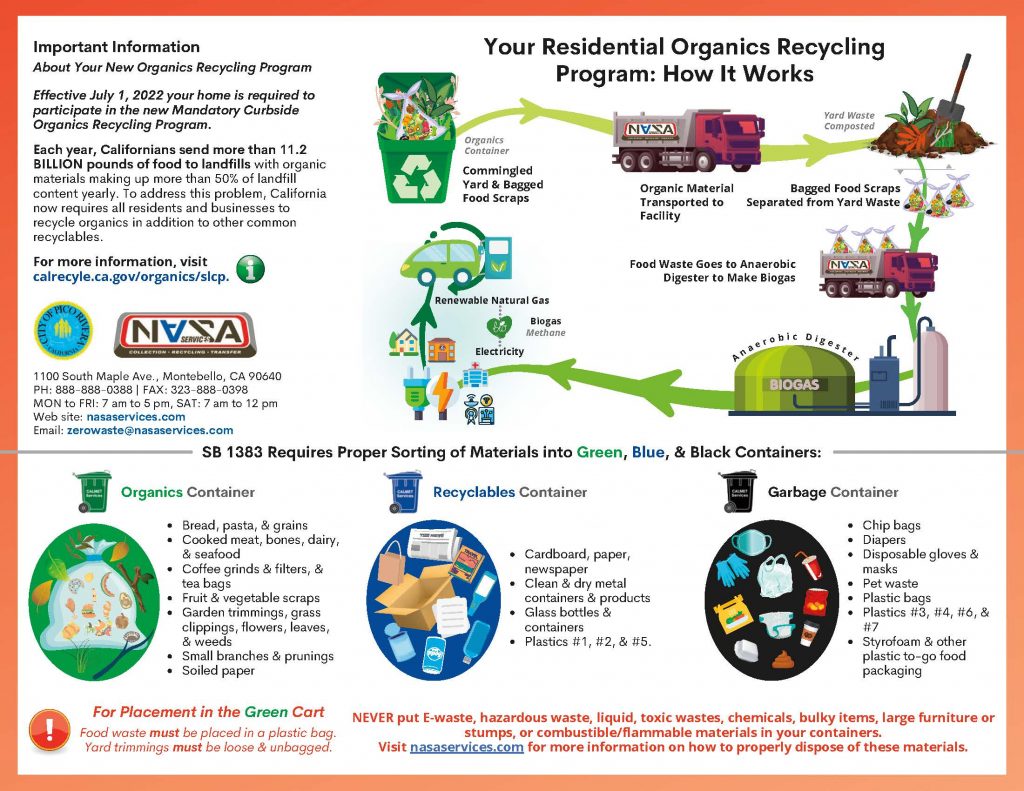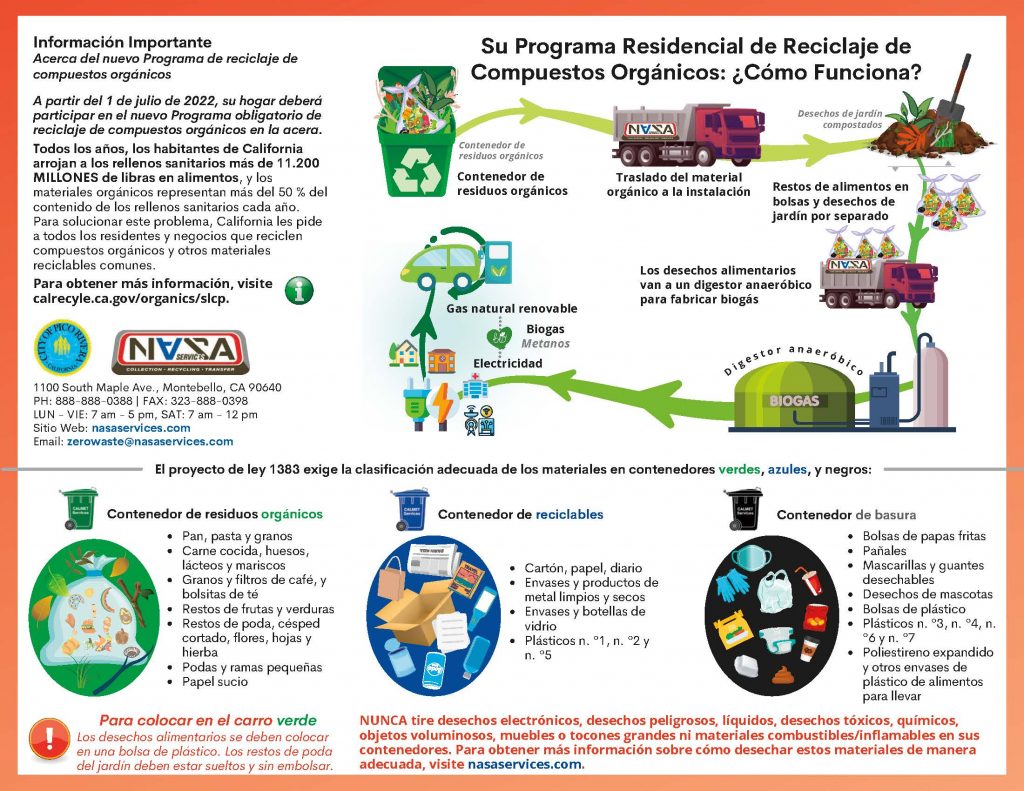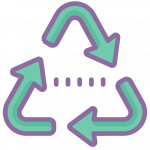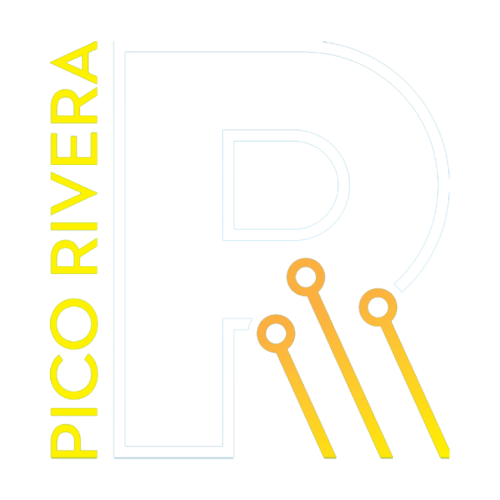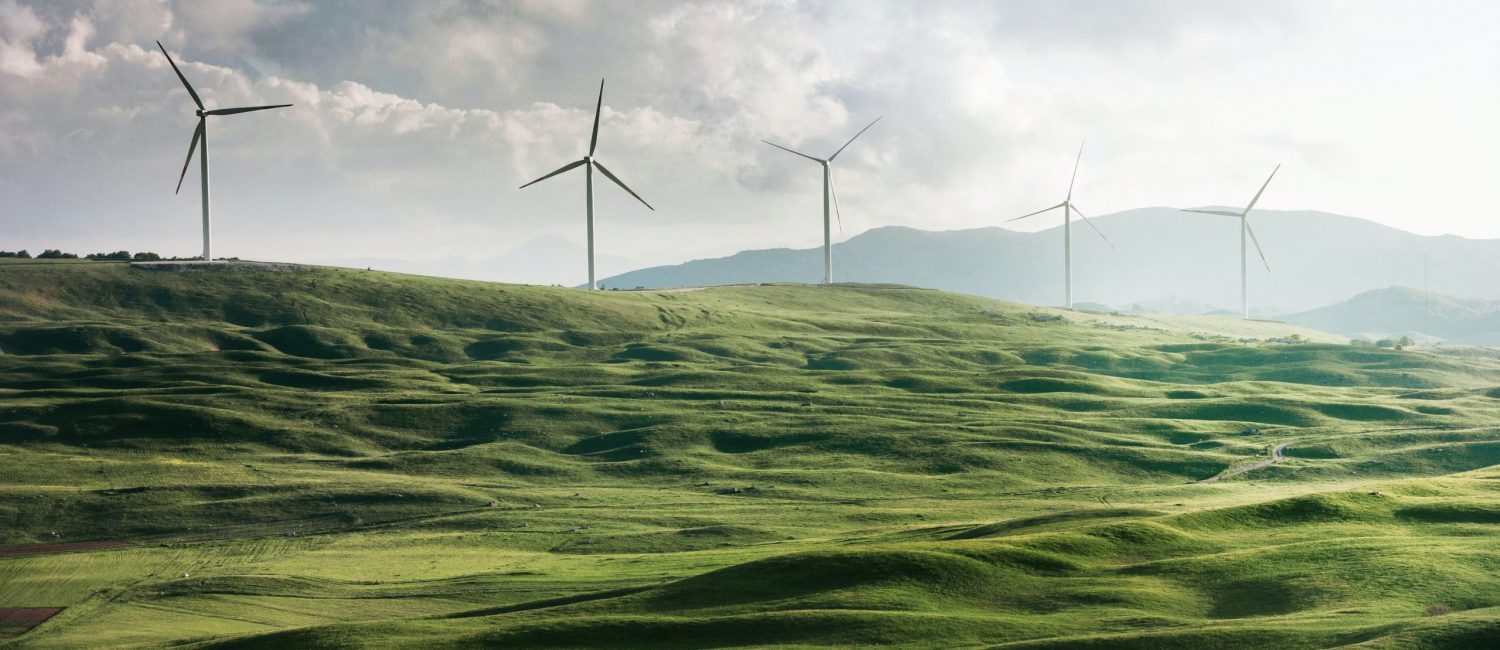
Materials Management
06/14/2023
Empower the Community through Waste Collection
The Office of Sustainability oversees the efficient collection of residential and commercial waste. Through collaboration with NASA, the City’s franchise waste hauler, the City diverts solid waste from landfills, prioritizing sustainability and environmental responsibility.
Simply put, materials management is controlling the balance between different materials throughout their lifecycle to minimize adverse environmental impacts. The process includes disposal, recycling, and reduction of resource consumption.
Projects
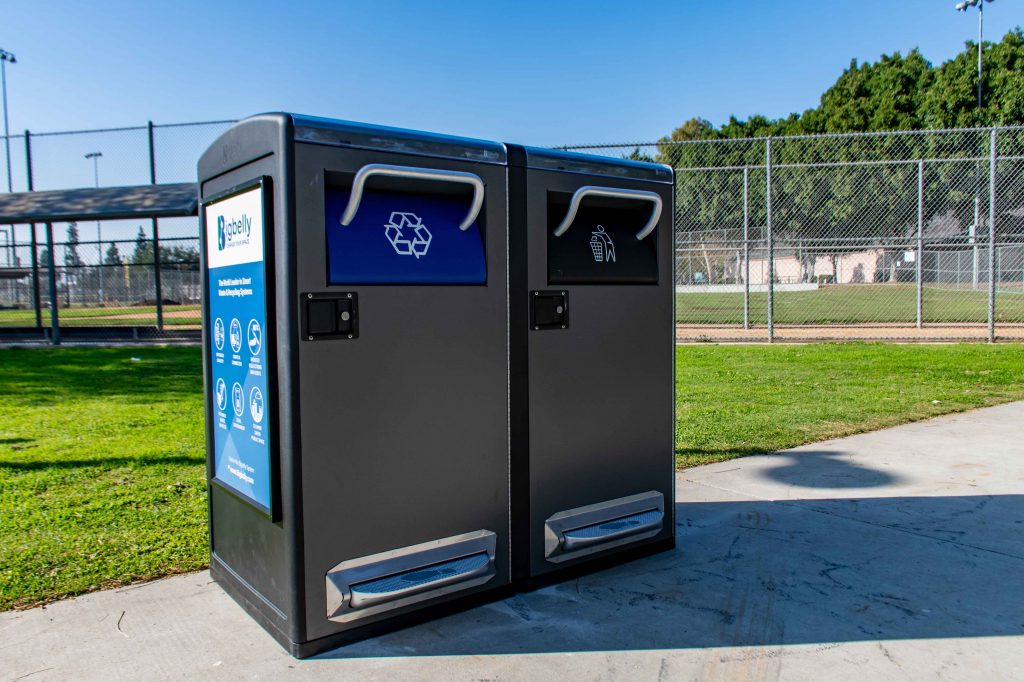
Pilot Bigbelly Smart Trash Bins at Smith Park
In an effort to combat overfilled trash cans and meet recent state organic waste guidelines, the City is launching the Bigbelly Smart Waste Bins Pilot Program. The program includes the installation of 50 smart waste bins throughout Smith Park.
The Bigbelly Smart Waste Bins are solar-powered and will improve the aesthetics of the park while reducing the amount of overfilled waste that may fall out. They will reduce the number of labor hours used to service the current trash bins.
Programs
- Residential Recycling Requirements
- Commercial Recycling Requirements
- Food Donation Information for Food Generating Businesses
- Food Donation Information for Food Recovery Organizations and Services
- Storm Water Pollution
- Vehicle Donation
- Apartment & Multi-Family Recycling
- Business Recycling
- Used Oil & Filter Recycling
- HHW & E-Waste
- Medical Waste, Needles, or Sharps Disposal
- Mulch Distribution
- Beverage Container Recycling
- NASA Residential Services Guide English & Spanish
- Paint Recycling
- Mattress Recycling
Waste Collection Services
The City of Pico Rivera offers three different containers to aid with sorting materials properly.
- Green Container (Organics) – Loose yard trimmings and bagged food scraps.
- Blue Container (Recycling) – Paper, metal, glass, and plastics.
- Black Container (Garbage) – Non-Organics
Organic Waste Program (SB1383)
Think Outside the Black Cart
The passage of Senate Bill 1383 (SB 1383) in September 2016 imposed statewide targets to reduce organic waste disposal by 75% by January 1, 2025 (based on 2014 levels) and recover at least 20% of currently disposed edible food for human consumption by 2025. The California Department of Resources Recycling and Recovery (CalRecycle) finalized and adopted SB 1383 guidelines in November 2020 with the approval of the Office of Administrative Law.
As a result, the City of Pico Rivera amended its waste contract with NASA Services to implement an organic waste diversion program aimed at reducing organic waste to comply with SB 1383’s food recovery mandates and significantly reduce food waste in the state of California.
The Organic Waste Programs include, but are not limited to, Single Family Green Waste Collection, Single Family Food Waste Collection, a Holiday Tree Collection Program, a Commercial Organics Waste Diversion Program, Composting Workshops, and Container Inspection Methods.
(Click to enlarge images)
Household Hazardous Waste
Household Hazardous Waste (HHW) products may not be disposed of in your regular materials containers. Any material labeled: toxic, poisonous, combustible, corrosive, flammable, or irritant needs to follow proper guidelines for disposal. A typical home can contain an array of household hazardous products for cleaning, painting, beautifying, lubricating, and disinfecting the house, yard, workshop, and garage. The health and safety of our families, neighborhoods, and environment are threatened when household hazardous waste is stored or disposed of improperly.
The chemical-based household products from a single home may seem insignificant; but when millions of homes across the community use similar products – handling, storing, and disposing of them improperly – the combined effect becomes a major problem. Our community and the environment are endangered when these products are discarded in household garbage, sinks, or storm drains.
The County of Los Angles holds a variety of HHW and electronic waste collection events year around throughout Los Angeles County. Please see link for upcoming event dates, times, and locations.
Some of the most common products have special guidance. Any material labeled: toxic, poisonous, combustible, corrosive, flammable, or irritant needs to follow proper guidelines for disposal. See more…
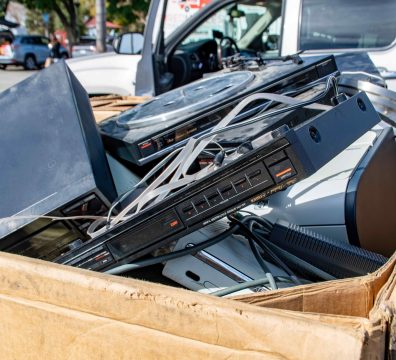
E-Waste
Electronics and corded devices may not be placed in trash or recycle containers.
- Televisions, Monitors, and computer components
- VCR/DVD players and entertainment systems
- Small kitchen appliances
- Lamps, chords, wires, power tools
- Phones and small portable electronics
- Car batteries, electric scooters
You can have these items picked up with bulky items or drop them off for free at NASA Services.
Sharps
You may not dispose of home-generated Medical Waste, Needles, or Sharps in your trash and recycling carts.
- Hypodermic needles
- Pen needles
- Intravenous needles
- Lancets
Any other devices that are used to penetrate the skin for the delivery of medications derived from a household/multi-family residence are considered Sharps. NASA Services provides FREE Sharps Collection once per year to all residents of the City of Pico Rivera; other medical waste must be contracted and paid for individually. Please contact NASA Services at 888-888-0388 to request a Sharps Collection container.
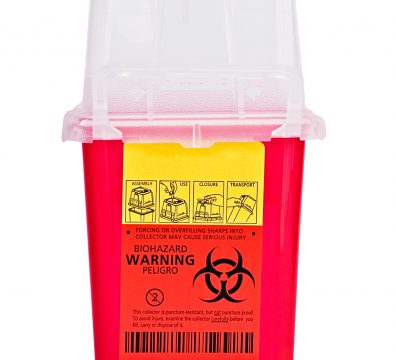
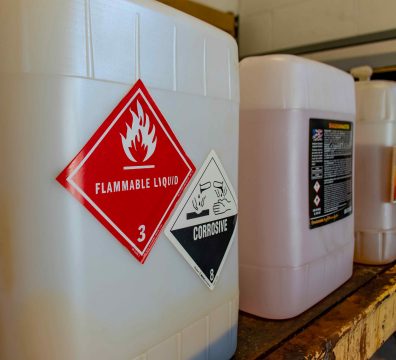
Oil
By law, used motor oil and filters must be disposed of at a certified collection point. You can receive $.40/gal for oil you recycle from:
- Cars
- Trucks
- Motorcycles
- Boats
- Lawn mowers
Paint
California residents and businesses can now recycle leftover paint for FREE at local retail stores. Drop-off sites are conveniently located throughout California for the collection and reuse/recycling of 5-gallons or less of:
- Primers
- Stains
- Sealers
- Clear coatings
Please note that proper disposal and recycling of paint is the law in California. Paint may not be disposed of in the trash or down the drain; and unused paint may NOT be ‘dried-out’ in an open container.
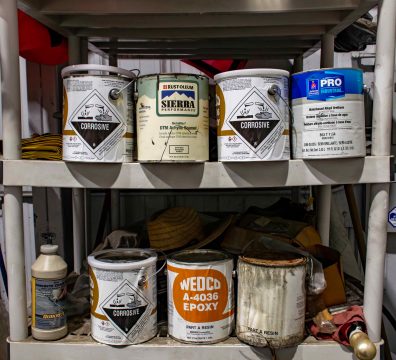
Drop Off and Collection Centers
Please call 888-CLEANLA or visit the Los Angeles County Household Hazardous Waste Collection Program website for a list of FREE and convenient ways to properly dispose of HHW.
The County of Los Angeles holds a variety of HHW and electronic waste collection events year around throughout Los Angeles County. Please visit the link for upcoming event dates, times, and locations. https://pw.lacounty.gov/general/enotifyCalendar/Calendar.aspx
Sharps
You can find a list of FREE Sharps drop-off locations or request a FREE mail-back sharps container through Clean LA https://pw.lacounty.gov/epd/hhw/Sharps.
Paint
For program details and locations, please call 855-724-6809 or visit www.PaintCare.org.
Oil
Certified Collection Centers in Pico Rivera:
Auto Zone:
9350 Whittier Boulevard
Pico Rivera, California 90660
562-948-3041
Auto Zone:
9234 Slauson Boulevard
Pico Rivera, California 90660
562-949-0185
Certified Collection Centers in Pico Rivera:
You can also find a list of FREE LA County disposal sites for residents to discard their non-contaminated used motor oil and filters here: https://pw.lacounty.gov/epd/hhw/UsedOil.
Bulky Items
There are two ways that residents may dispose of bulky items that do not fit into the residential service carts:

On-Call Bulky Collection – Pico Rivera residents are eligible for 10 FREE bulky item pick-ups per year, and up to 4 items per pick-up. These pick-ups can also be used to collect corded devices and other non-hazardous electronic waste such as computers, telephones, televisions, and stereo equipment.

Annual Bulky Item Collection Week – This event is held each spring. During Bulky Item Collection Week, residents may place an unlimited amount of acceptable items at the curb on the regular day of collection. Acceptable items are listed below.
To learn more about what items can be collected, or to schedule a bulky item pick-up, please contact NASA Services at (323) 888-0388.
Mattress Recycling
California residents can drop off their old mattresses and box springs at no-cost at a participating collection site or event. Unit limits vary by location and a residency restriction may apply. https://byebyemattress.com/programs-by-state/california/#ca-locator
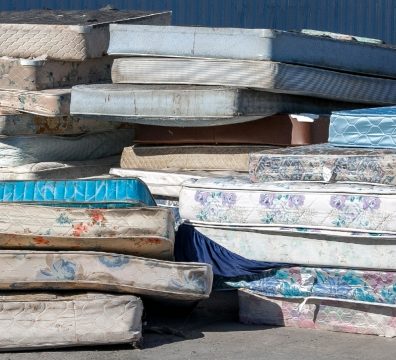
Demolition/Construction Waste
Permits may be obtained from the City of Pico Rivera City Hall located at 6615 Passons Blvd., Pico Rivera 90660, and are FREE of charge. Permits are valid for 7 days, and it is the residents’ responsibility to obtain and comply with all City rules and regulations pertaining to the issuance of use permits.
Report Illegal Dumping
Contact our Code Division at (562) 801-4413 if you witness a dumping incident.
Be sure to note information like a description of the person, the specific address they came from or returned to, the vehicle’s make/model/color if applicable, and the precise dumping location. You may remain anonymous, but providing as much detail as possible will expedite the process.
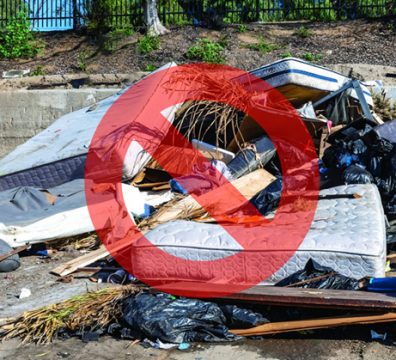
Illegal Dumping
Illegal dumping is the placement of unwanted items in locations other than the owner’s trash or recycling containers. You often see commonly dumped items, such as mattresses, couches, dressers, televisions, bags of trash, etc. at the curb, on the sidewalk or parkway (strip between curb and sidewalk), in the street, or on even your own or someone else’s property. Storing such items on private property in public view is also illegal according to Pico Rivera, California Municipal Code 8.12.460.
- The fine for illegally dumping items can be very high and is not worth the risk.
- Anything left on the curb without a scheduled pickup through NASA Services will be treated as illegal dumping.
If you have a bulky-item or items that need to be picked up, please call NASA Services at 888.888.0388 for a Bulky Item Pick-up request.
Illegal Roll-Off Bins
- In March of 2023, an ordinance prohibiting unauthorized waste containers, also known as roll-off bins, went into effect. The ordinance provides Staff and respective contractors with the authority to enforce provisions and procedures related to removing unauthorized waste containers within the City.
- The ordinance provides two (2) options the public can use for waste removal and diversion: 1) Contract directly with NASA Services, or 2) Self-haul under specific circumstances.
- There are various benefits this ordinance brings to the City:
- Quality of Life: The ordinance addresses the unsightliness of unkept containers which can contribute to preserving property values and be a source of community pride.
- Health and Safety: The ordinance aims to create safety by properly placing the containers or allowing City staff to review and recommend the proper placement of said containers.
- Compliance with State Regulations: Ensures compliance with State regulations and improves the City’s ability to meet State diversion goals.
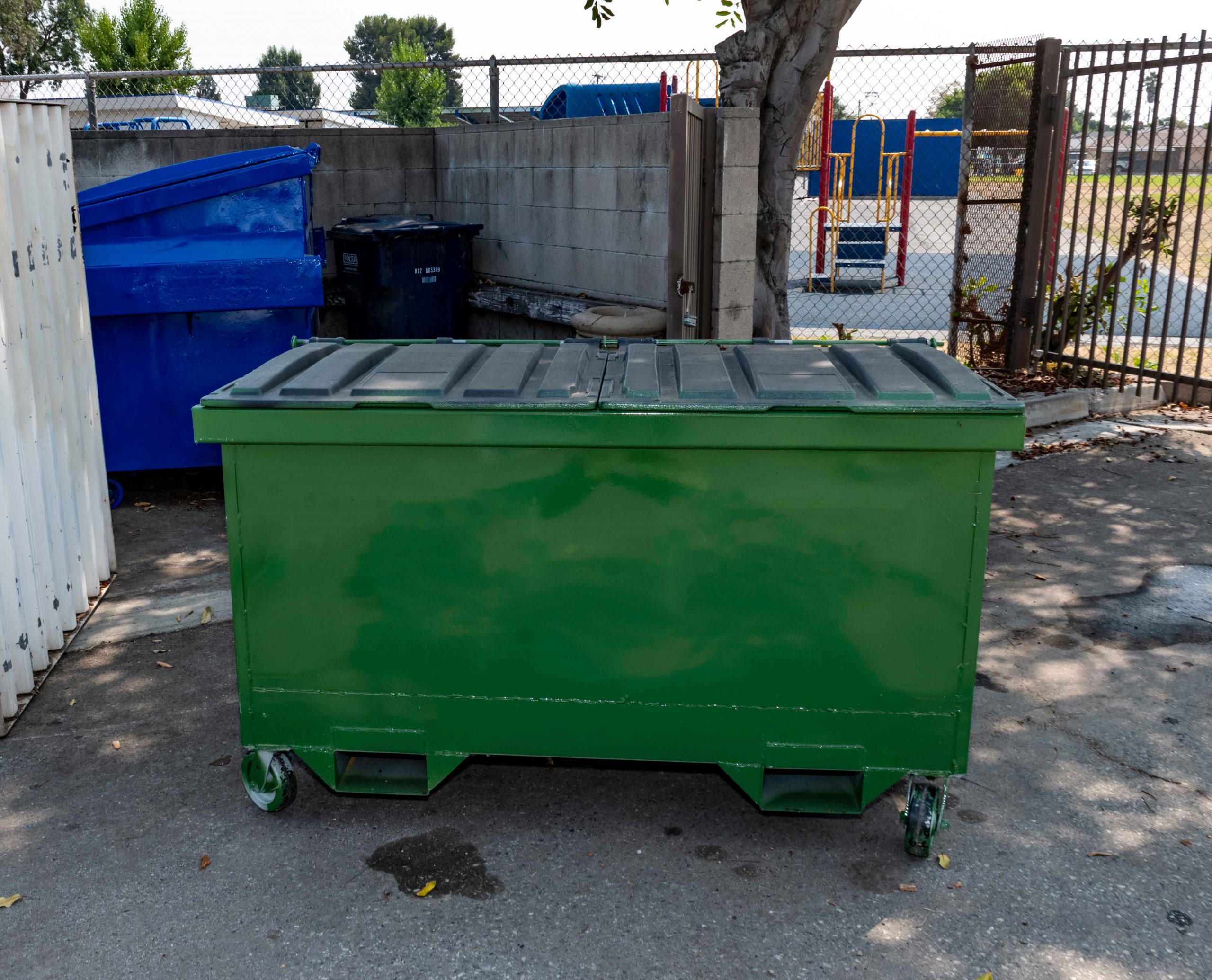
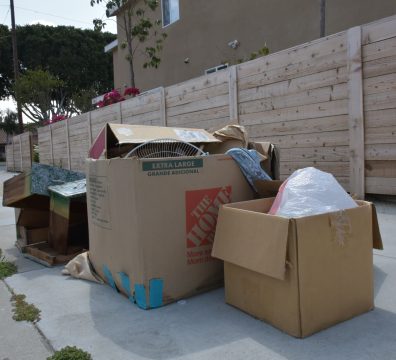
Discourage Illegal Dumping
- Nicely landscaping the parkway in front of your property with plants or rocks will often cause a dumper to look elsewhere.
- Placing a visible sign near your carts/cans or trash enclosure may repel a dumper. Effective signs include: “Security,” “This area video monitored,” or “No Dumping Allowed!”
- Lighting is important! Motion detector lights are recommended for your property and trash enclosure area, and streetlamps should be in working order. To report a street light problem, visit the Virtual City Hall Service Request page to initiate a repair.
- Talk with your neighbors! Collaborate to watch for unusual activity in your neighborhood.
Special Collections
Horse Manure and Bedding
NASA offers special collection and recycling of horse manure and bedding. Working with a local facility, all materials are composted rather than disposed of in a landfill.
For more information on bin sizes and prices for manure collection, please contact NASA Services at (323) 888-0388.

Resources
Click on an icon below to view what the City has to offer regarding Energy, Sustainability, and Materials Management!
Last modified: 04/24/2024
A New Way to Engage
6615 Passons Boulevard Pico Rivera, CA 90660
Phone Number: (562) 942-2000
City Hall is open Monday – Thursday
7:30AM to 5:30PM
